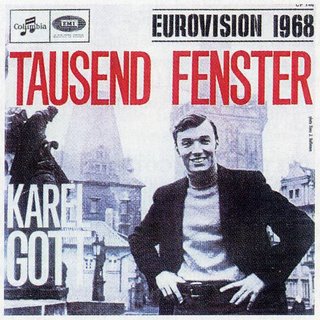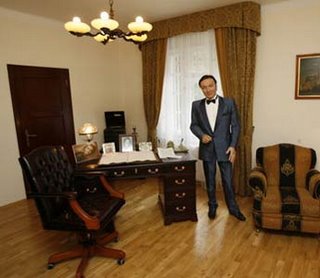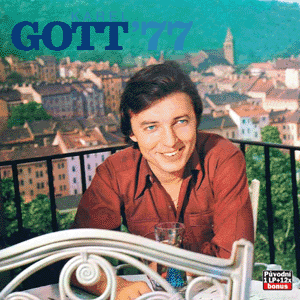Touched by the Hand of Gott
Dobry vecher! Guten Abend! Comrades, be upstanding for Kaaaaarel Gotttttt!!!!! To some he's a geriatric crooner who won't retire, but to others he's a heartthrob with a voice of gold.In the 1960s and 70s, Gott was the undisputed pop prince of Mitteleuropa and he's now a Czech institution. If you've never heard of the Gottmeister, here are a few things you should know about him.
Dobry vecher! Guten Abend! Comrades, be upstanding for Kaaaaarel Gotttttt!!!!! To some he's a geriatric crooner who won't retire, but to others he's a heartthrob with a voice of gold.In the 1960s and 70s, Gott was the undisputed pop prince of Mitteleuropa and he's now a Czech institution. If you've never heard of the Gottmeister, here are a few things you should know about him.
EASTERN BLOC POP
Whilst the West was going crazy for Elvis and the Beatles, the entire Eastern Bloc, it seems, was listening to the 'Golden Voice of Prague', Karel Gott. During the Cold War, there wasn't a household between Magdeburg and Vladivostok, which didn't (have to) own at least one of Karel's discs.
Karel Gott: Unafraid of the Kazachok
Dubbed the 'Slavic Sinatra' and 'Elvis of the Moldau', Gott's early oeuvre consisted of upbeat Czech rock 'n' roll, be-bop, smoochy ballads, and covers of Western pop hits. What distinguished Gott from his Western counterparts was his distinctive tenor wail, which he developed whilst an opera student. Gott's vocal skills are best demonstrated in his stirring interpretations of Soviet standards, which make the Red Army Choir's output sound positively half-hearted. His renditions of 'Kalinka' and 'Vltava,' are fantastically evocative, and listening to them, you can almost imagine yourself in Moscow circa 1972, heading down the Leninski Prospect in a Lada, discussing the latest 5-year plan with your pals Dmitri and Alexei.Privet! Oh, for a revival in 70s Soviet graphic design
As the Eastern Bloc's premier pop sensation, Gott was so valuable to the Czechoslovakian regime (He once joked that his record sales exceeded his country's annual GDP), that in the early 1960s, when he left to live in West Germany, Communist party secretary Gustav Husak sent him a grovelling letter begging him to return. Some years later, in 1985, Gott was finally rewarded for his loyalty by being made Czechoslovakia's 'National Artist,' thus becoming state property.
The pop prince of Prague enjoyed privileges unknown to most CSSR citizens. He was allowed to tour the world, earning heaps of hard currency and a big female following wherever he went. His heart-on-sleeve songs did particularly well in continental Europe, where Schmalz only means cooking fat. Gott was especially popular in that Mecca of taste, West Germany, where he contributed significantly to the repairing of post-war Czech-German relations by getting the Deutsche Hausfrauen mighty hot unter der collar.
Bonny Prinz Karel: Gott seduces West Germany
TOO POP FOR THE SWOTS
Gott might have been the central European housewive's choice, but you won't catch many an academic humming his back catalogue. The singer was long the punching bag for the Czech intelligensia, who associated his music with the decline of Czechoslovakian cultural life under Communism. And they had a point: In 1977 Gott signed the government-sponsored anti-Charta, which condemned cultural dissidents Charta 77's protest petition. But it wasn't so much his siding with the regime that upset Czech intellectuals, but his apparent lack of opposition to it. They took the lofty, Theodore Adorno-esque view that Karel's sentimental, apolitical pop music helped the Communist regime maintain power by distracting the Czech people from the grim realities of life under totalitarianism. They don't expect much from light entertainers in the Czech republic, do they? The country's chief librarian-botherer, Milan Kundera, was one of Gott's more notable enemies. In 'The Book of Laughter and Forgetting', Kundera, clearly after a job at the NME, describes Gott's output as 'Music minus thought' which 'reflects the inherent idiocy of human life.'Milan Kundera: Unlikely to know the words to 'Lady Carnival'
EUROVISION FLOP
Karel did really badly in the Eurovision song contest, and that deserves respect.In 1968's Grand Prix, Gott represented Austria with the woeful 'Tausend Fenster.' He was awarded nil points by everyone except Spain, whose judges generously gave him 2, possibly because he'd also entered a Spanish song. But then again, this was the year in which Cliff Richard's dreadful 'Congratulations' came second in the contest.
Gott help us: Karel steels himself for a Grand Prix crash
HE OPENED A MUSEUM TO HIMSELF!
In 2006, the man who had already been immortalised in wax and honoured with countless awards, opened his own museum cum shrine, a privilege normally reserved for the dead. The wittily named 'Gottland' near Prague, where Gott lived for,ooh, all of about 2 days, offered the visitor a valuable insight into Gott's taste in home furnishings. There was also a large amount of merchandise on sale, including Karel's own-brand wine, 'Charlotta,' named after the daughter he recently sired with his 30-year old wife. And Gott's own Eau de Cologne, an olfactory delight that smelt of 'tobacco, figs, and guitars.'Sadly, in 2009, Gottland was forced to close, due to 'financial difficulties.'
Gottland: When it comes to selling himself, Gott's no dummy
THE GOLDEN VOICE IN THE PALACE
In April 1976, Gott performed at the opening celebrations of the now-extinct East German parliament building and fun palace, the Palast der Republik.During the concert, Gott brushed bri-nylon with imperialist singers such as Juliette Greco, and commie fave, Tony Christie. It was also kitted out with interpreter headsets for the audience, handy, had Karel slipped into one of his 6 trillion other languages.
Berlin's now vanished icon of retro-groovy architecture: The Palast der Republik
Gott was a was a hot ticket in the GDR, whose cultural officials carefully ensured that most decent pop acts were prevented from entering the country. In 1987, when Gott performed during the 750th anniversary of Berlin celebrations, there were so many flowers thrown on stage, he had to stop his act so that three people could come up and clear them off. Top that, Justin Bieber!
"Eeeeiiiiiiih! Karel, wir lieben Dich!" The East Germans prepare to rush the show
HIS ALBUM COVERS ARE GREAT
Gott's album covers have more retro-hip potential than Prague's entire transport system.Just look at these:
Great, eh?
HIS NAME IS TOPS
If he were English, his name would be 'Charles God.'Gott's best tunes:
1. Trezor. Enthusiastic, manic Czech rock 'n' roll at it's best. Check out the yodelling bits!
2. All the Russki tunes.
3. Tam, Kad Chodi Vtra spat. Ahhhh- aaaahhhhhhh-eeiiiiie!
4. Lady Carnival. A Tom Jones-esque mega-hitovi in the 1970s.
5. Vit. Insanely cheerful.













This comment has been removed by a blog administrator.
ReplyDeleteGreeeat blog Maisie! I am waiting for a post on Baja Mali Knindza...and though that may prove conflictual - and we don't want your blog to be invaded by right-wing radicals - Baja is actually an illuminating example of folk-machoist-patriotic muzika in 90's Jugoslavija...I confess I adore his music and he's the king of the My Music folder...Svaka cast Maisie!
ReplyDeleteHi there --
ReplyDeleteI put up a link to your marvelous entry on KG from my blog - www.germans-under-cover.blogspot.com - where you can download two handfuls of Karel's German-language cover versions. Btw, he already started recording Schlager in the mid-60s. ;)
Bestest,
RB
' The singer is the punching bag for the Czech intelligentsia, who associate his music with the decline of Czechoslovakian cultural life under Communism. They take the lofty, Theodore Adorno-esque view that Karel's sentimental, apolitical pop music helped the Communist regime maintain power, by distracting the Czech people from their social and political situation.'
ReplyDeleteWhat the hell do they think pop music does in the West? Without such opiates as pop music and sport, there'd be a revolution in Australia.
This comment has been removed by a blog administrator.
ReplyDeletea wonderful text! i grew up in germany in the 70s, and karel was a part of that.
ReplyDelete